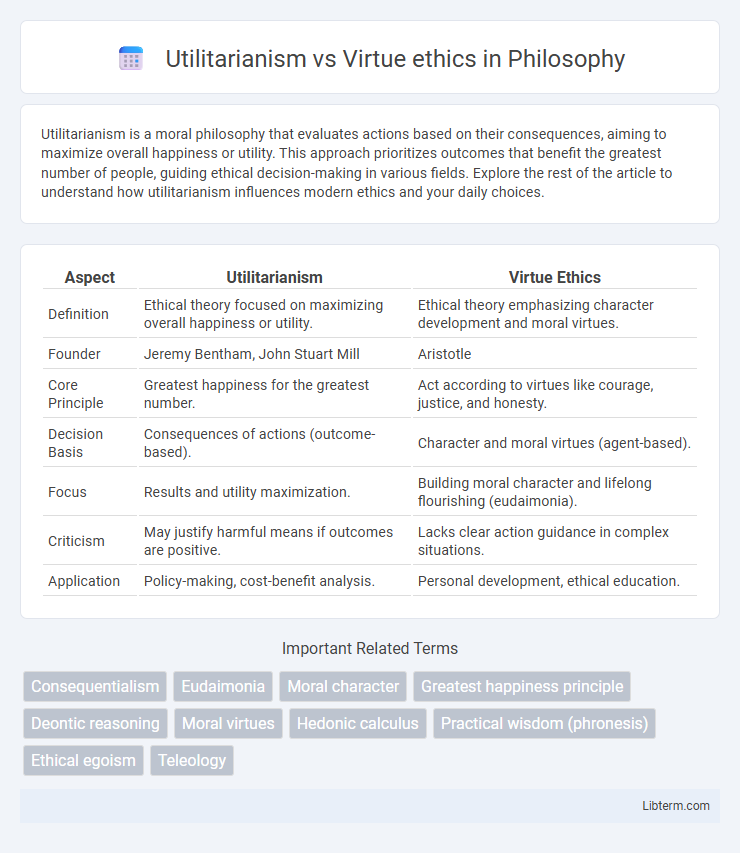Utilitarianism is a moral philosophy that evaluates actions based on their consequences, aiming to maximize overall happiness or utility. This approach prioritizes outcomes that benefit the greatest number of people, guiding ethical decision-making in various fields. Explore the rest of the article to understand how utilitarianism influences modern ethics and your daily choices.
Table of Comparison
| Aspect | Utilitarianism | Virtue Ethics |
|---|---|---|
| Definition | Ethical theory focused on maximizing overall happiness or utility. | Ethical theory emphasizing character development and moral virtues. |
| Founder | Jeremy Bentham, John Stuart Mill | Aristotle |
| Core Principle | Greatest happiness for the greatest number. | Act according to virtues like courage, justice, and honesty. |
| Decision Basis | Consequences of actions (outcome-based). | Character and moral virtues (agent-based). |
| Focus | Results and utility maximization. | Building moral character and lifelong flourishing (eudaimonia). |
| Criticism | May justify harmful means if outcomes are positive. | Lacks clear action guidance in complex situations. |
| Application | Policy-making, cost-benefit analysis. | Personal development, ethical education. |
Introduction to Utilitarianism and Virtue Ethics
Utilitarianism, founded by Jeremy Bentham and later refined by John Stuart Mill, emphasizes maximizing overall happiness or utility as the primary ethical principle, promoting actions that result in the greatest good for the greatest number. Virtue ethics, rooted in Aristotle's philosophy, centers on developing moral character and virtues such as courage, temperance, and justice, guiding individuals to act according to their intrinsic moral qualities rather than solely focusing on outcomes. Both theories provide distinct frameworks for ethical decision-making: utilitarianism prioritizes consequences, whereas virtue ethics emphasizes moral character and intentionality.
Historical Background and Key Philosophers
Utilitarianism emerged in the late 18th century, primarily shaped by Jeremy Bentham and later refined by John Stuart Mill, emphasizing the greatest happiness principle to evaluate moral actions based on their consequences. Virtue ethics traces back to ancient Greece, with Aristotle as its central figure, advocating for character development and the cultivation of moral virtues as the foundation of ethical behavior. Both frameworks offer contrasting approaches: utilitarianism centers on outcomes and collective welfare, while virtue ethics prioritizes individual moral character and intrinsic qualities.
Core Principles of Utilitarianism
Utilitarianism centers on the core principle of maximizing overall happiness or utility, where the moral worth of an action is determined by its outcomes. It emphasizes consequences and promotes actions that result in the greatest good for the greatest number of people. This contrasts with Virtue Ethics, which focuses on character traits and moral virtues rather than the results of specific actions.
Fundamental Concepts of Virtue Ethics
Virtue ethics centers on the development of moral character and virtues such as courage, temperance, and justice, emphasizing the importance of cultivating good habits to achieve eudaimonia, or human flourishing. Unlike utilitarianism, which evaluates actions based on their consequences and overall utility, virtue ethics prioritizes the inherent qualities and intentions of the moral agent. This approach traces its roots to Aristotle's Nicomachean Ethics, highlighting the role of practical wisdom (phronesis) in making ethical decisions.
How Each Theory Defines Morality
Utilitarianism defines morality based on the principle of maximizing overall happiness or utility, assessing actions by their consequences and prioritizing the greatest good for the greatest number. Virtue ethics, grounded in Aristotelian philosophy, defines morality through the cultivation of character traits or virtues such as courage, temperance, and justice, emphasizing moral development and the inherent qualities that constitute a good person. While utilitarianism focuses on external outcomes to determine right and wrong, virtue ethics centers on internal moral character and the intent behind actions.
Decision-Making Processes Compared
Utilitarianism bases decision-making on calculating the greatest overall happiness or utility resulting from an action, emphasizing outcomes and cost-benefit analysis. Virtue ethics focuses on the moral character and virtues of the decision-maker, promoting choices aligned with traits like honesty, courage, and compassion, rather than solely outcomes. Decision-making in virtue ethics is context-dependent and guided by practical wisdom, contrasting with utilitarianism's quantitative approach to evaluating consequences.
Strengths and Weaknesses of Utilitarianism
Utilitarianism's strength lies in its clear, outcome-focused approach that promotes the greatest happiness for the greatest number, making it practical for decision-making in public policy and ethics. However, it faces criticism for potentially justifying morally questionable actions if they produce overall positive consequences and for undervaluing individual rights and justice. The theory's emphasis on quantifying happiness can also be challenging due to the subjective nature of pleasure and pain measurement.
Strengths and Weaknesses of Virtue Ethics
Virtue ethics emphasizes character development and moral virtues such as courage, honesty, and compassion, fostering personal growth and ethical consistency across various situations. It provides a flexible approach that accounts for context and individual differences, avoiding the rigid rule-following of utilitarianism. However, virtue ethics faces challenges in offering clear guidance for action in complex dilemmas and may lack the systematic decision-making framework found in consequentialist theories.
Real-World Applications and Case Studies
Utilitarianism guides decision-making in public policy by maximizing overall happiness, evident in healthcare resource allocation during pandemics. Virtue ethics emphasizes character traits, influencing leadership styles in corporations to foster trust and integrity among employees. Case studies in environmental ethics show utilitarian approaches prioritize cost-benefit analysis of sustainability projects, while virtue ethics encourage cultivating environmental stewardship.
Conclusion: Choosing Between Utilitarianism and Virtue Ethics
Choosing between Utilitarianism and Virtue Ethics depends on whether one prioritizes outcomes or character development; Utilitarianism emphasizes maximizing overall happiness through consequences, while Virtue Ethics focuses on cultivating moral virtues and personal integrity. Ethical decision-making guided by Utilitarianism often involves calculating the greatest good for the greatest number, whereas Virtue Ethics promotes consistent moral excellence and practical wisdom. Integrating both approaches can provide a more comprehensive framework by balancing outcome-oriented reasoning with character-based values.
Utilitarianism Infographic

 libterm.com
libterm.com